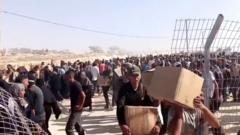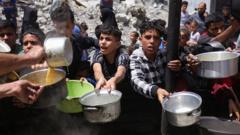The newly formed Gaza Humanitarian Foundation (GHF), supported by the US and Israel, has commenced aid distribution in Gaza, raising concerns among humanitarian agencies about the implications of its security-driven approach to aid delivery.
New US-Backed Aid Initiative Launches Amid Controversy in Gaza

New US-Backed Aid Initiative Launches Amid Controversy in Gaza
The Gaza Humanitarian Foundation begins food distribution in the region, facing backlash from the UN and humanitarian groups over its methods and objectives.
A controversial new organization backed by the United States and Israel has begun aid distribution operations in Gaza. The Gaza Humanitarian Foundation (GHF) announced that it started delivering food supplies to designated "Secure Distribution Sites" on Monday. However, specifics regarding the amounts distributed and the locations involved were not disclosed. This initiative employs armed American security contractors which aims to replace the UN as the primary aid distributor for the 2.1 million Palestinians in the region, amidst warnings from experts about an impending famine resulting from an Israeli blockade that has lasted for 11 weeks.
The UN, alongside various humanitarian groups, has denounced GHF's approach, stating it undermines humanitarian principles and risks "weaponizing aid." In response to claims that Hamas has been siphoning off humanitarian assistance, Israel contends that an alternative system is necessary to ensure aid reaches those in need.
On the day of GHF's announcement, a statement highlighted that the organization had begun operating and confirmed the delivery of several truckloads of food. Additional shipments were planned for subsequent days. Photographs released displayed a small group of individuals transporting boxes from undisclosed locations. The BBC sought clarification from GHF regarding the quantity of aid delivered and the number of beneficiaries, but as of yet received no response.
Additionally, the Foundation appointed John Acree as interim executive director following the resignation of Jake Wood, who cited the inability of GHF to adhere to essential humanitarian principles as a reason for his departure. In contrast, the GHF board defended its system, alleging that critics are primarily concerned with maintaining the current aid status quo rather than prioritizing humanitarian assistance.
Through its distribution model, GHF plans to allow security-cleared Palestinians to collect aid at a limited number of sites, primarily situated in southern Gaza, which will be guarded by American contractors and accompanied by Israeli troops. Nevertheless, UN organizations and other aid groups have insisted that they will not engage with any framework that fails to adhere to fundamental humanitarian protocols. Concerns have also been raised regarding access issues for vulnerable populations, including the elderly and disabled, who may be excluded from aid sources under this new system.
Hamas, the Islamist political organization governing Gaza, has cautioned Palestinians against engaging with GHF, condemning the initiative as potentially sowing chaos and exacerbating starvation among civilians. In contrast, GHF condemned Hamas's alleged threats against aid groups and reiterated its commitment to facilitating aid access for Gazans.
Following the introduction of the blockade starting March 2, Israel has faced scrutiny over its humanitarian strategy, particularly after escalating military operations resumed two weeks later, terminating a prior ceasefire with Hamas. Israeli officials assert these measures are designed to compel Hamas to release hostages held in the region. Access to aid has resumed, with Israel reporting approximately 665 truckloads of supplies delivered, including essentials such as baby food and medical supplies, although critics argue that this volume fails to meet immediate needs and that rising food insecurity remains a pressing challenge, with half a million people at risk of starvation in the near future. The ongoing conflict has resulted in a staggering toll, with recent reports indicating a death toll of at least 53,977 in Gaza since the escalation began following Hamas's attacks on October 7, 2023.




















